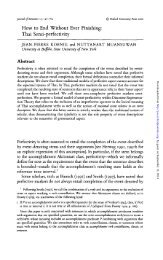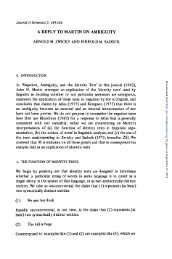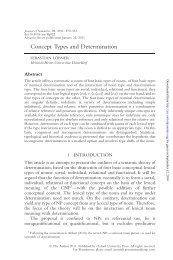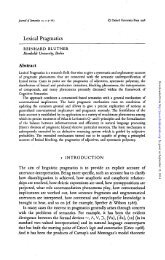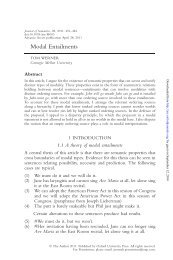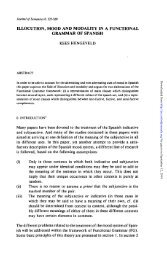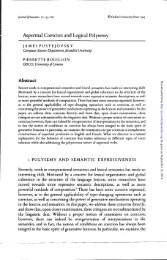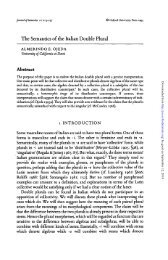Exclusive Company: Only and the Dynamics of Vertical Inference ...
Exclusive Company: Only and the Dynamics of Vertical Inference ...
Exclusive Company: Only and the Dynamics of Vertical Inference ...
You also want an ePaper? Increase the reach of your titles
YUMPU automatically turns print PDFs into web optimized ePapers that Google loves.
26 <strong>Only</strong> <strong>and</strong> <strong>the</strong> <strong>Dynamics</strong> <strong>of</strong> <strong>Vertical</strong> <strong>Inference</strong><br />
—at crunch-rime, Peter once again retreats to a straightforward conjunctive<br />
analysis on which (70a) is simply unpacked into a conjunction <strong>of</strong> <strong>the</strong> clauses in<br />
( 7 ob-d).<br />
(70) a. Man in so far as he is rational is tearful.<br />
b. Man is rational.<br />
c. Man is tearful.<br />
d. Every rational [thing] is tearful.<br />
It is against <strong>the</strong>se conjunctive analysf that <strong>the</strong> treatment <strong>of</strong> what we might<br />
call 'two-sided only' must be understood—<strong>and</strong> that <strong>of</strong> two-sided all as well. As<br />
we have seen, <strong>the</strong> traditional account <strong>of</strong> universals is as bilateral as <strong>the</strong><br />
traditional account <strong>of</strong> exclusives; both <strong>Only</strong> A is B (<strong>Only</strong> As areBs) <strong>and</strong> EveryBis<br />
A (All Bs are As) are taken to entail <strong>the</strong> existence <strong>of</strong> Bfs) while excluding <strong>the</strong><br />
possibility <strong>of</strong> any non-A B(s). 37 But even as <strong>the</strong> scholastics accepted <strong>the</strong><br />
unpacking <strong>of</strong> Tantum/Solus homo est rationalis into a conjunction <strong>of</strong>'homo est<br />
rationalis' + 'nichil aliud ab homine est rationale', <strong>the</strong>re are some suggestions<br />
that <strong>the</strong>se two components may not be on all fours:<br />
It is asked why 'alone' [solus] is called an exclusive ra<strong>the</strong>r than an inclusive; for when someone<br />
says 'Socrates alone is running', Socrates is included under running but <strong>the</strong> o<strong>the</strong>rs are excluded.<br />
It must be said that it is because <strong>the</strong> inclusion occurs not as a result <strong>of</strong> <strong>the</strong> force <strong>of</strong> <strong>the</strong> word but<br />
as a result <strong>of</strong> <strong>the</strong> statement as it is before <strong>the</strong> 'alone' is inserted into it. The exclusion, on <strong>the</strong><br />
o<strong>the</strong>r h<strong>and</strong> ... does occur as a result <strong>of</strong> <strong>the</strong> force <strong>of</strong> <strong>the</strong> word ['alone']. (William <strong>of</strong> Sherwood,<br />
Treatise on Syncategorematic Words, XI.6, in Kretzmann 1968: 71-2; cf. also St. Thomas Aquinas<br />
(Pegis 1945) on only in Sutntna Theologica, la, q. 31, arts. 3, 4)<br />
As we saw above in our exploration <strong>of</strong> <strong>the</strong> whiskey <strong>and</strong> Zantac examples, <strong>the</strong><br />
context in which only occurs may indeed entail inclusion, but not necessarily<br />
because <strong>of</strong> <strong>the</strong> presence <strong>of</strong> only.<br />
If <strong>the</strong> Williams <strong>of</strong> Ockham <strong>and</strong> Sherwood, Walter Burley, <strong>and</strong> <strong>the</strong>ir<br />
colleagues had only taken <strong>the</strong> trouble to consult Grice on implicature, Lewis on<br />
accommodation, <strong>and</strong> Stalnaker on assertion <strong>and</strong> presupposition, <strong>the</strong> reign <strong>of</strong><br />
<strong>the</strong> conjunctive analysis might have been far shorter-lived <strong>and</strong> <strong>the</strong> industry<br />
devoted to explicating <strong>the</strong> relation between an only sentence <strong>and</strong> its prejacent<br />
counterpart might have emitted fewer pollutants into <strong>the</strong> scholarly atmosphere.<br />
Yet it must be conceded that <strong>the</strong> atmospheric conditions in <strong>the</strong> conjunctionalist<br />
heyday had charms <strong>of</strong> its own, as Ockham's Summa Logicae makes clear.<br />
After cataloguing various 'improper' senses <strong>of</strong> only, those which are taken with<br />
restricted scope ('no more than [within a fixed domain]') as opposed to <strong>the</strong><br />
purely exclusive 'proper' sense, 38 Ockham (1980: 137) remarks that<br />
Downloaded from http://jos.oxfordjournals.org/ by guest on September 12, 2014<br />
These are <strong>the</strong> senses, <strong>the</strong>n, in which <strong>the</strong> exclusive expression can be taken improperly. And<br />
perhaps <strong>the</strong>re are still o<strong>the</strong>r senses in which it can be taken improperly. But since <strong>the</strong>y are not<br />
as widely used as <strong>the</strong> ones we have dealt with, I will leave <strong>the</strong>m to <strong>the</strong> specialists.



